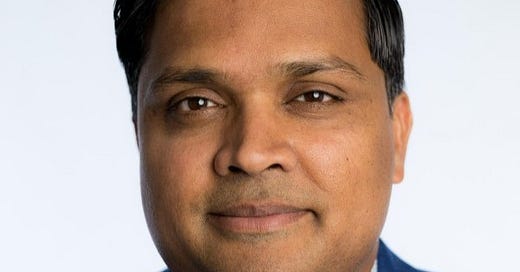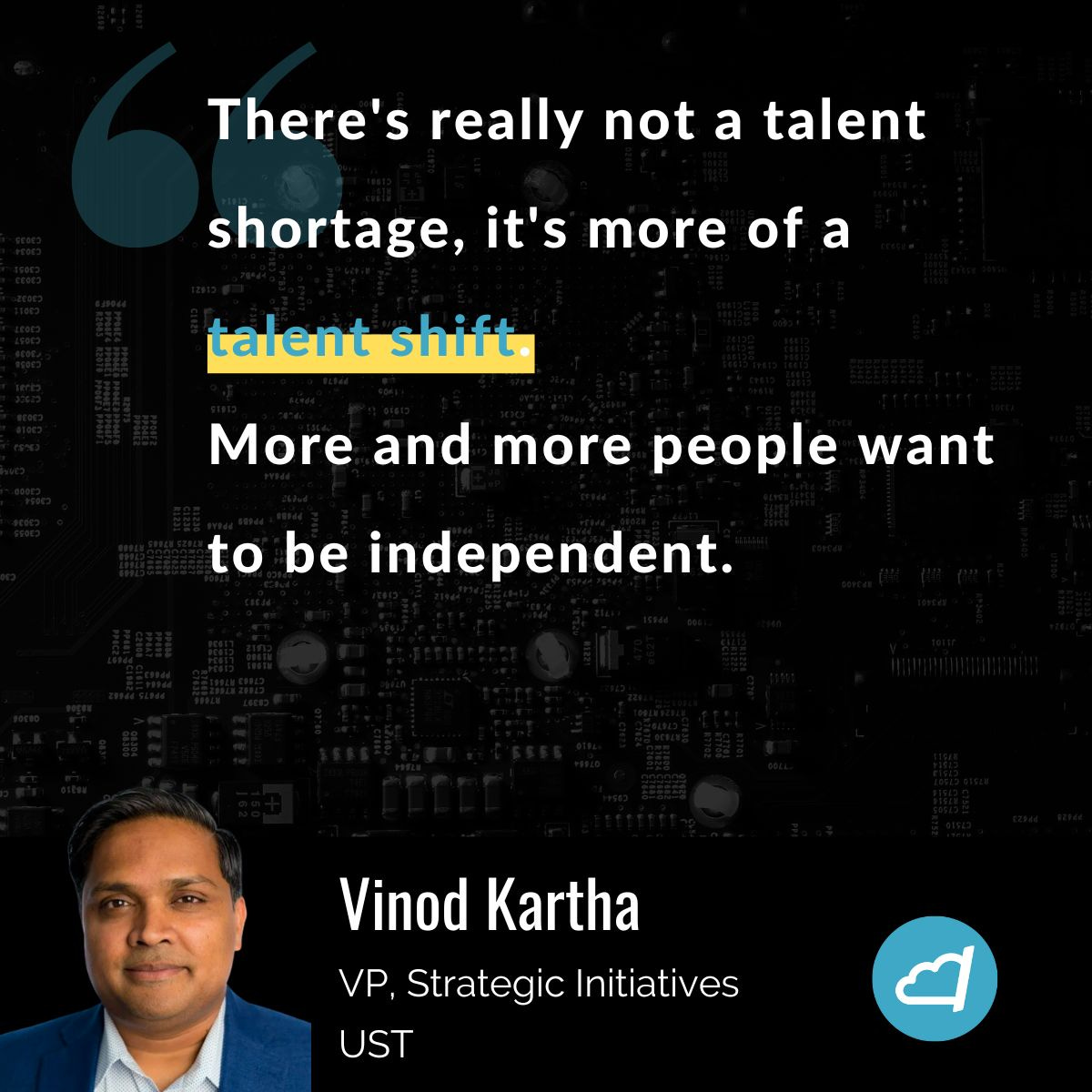Vinod Kartha, VP of Strategic Initiatives at UST
From Talent Acquisition to Workforce Ecosystem
Leaders, Vinod is the ideal leader and ideal champion for Open Talent.
Vinod leads strategic initiatives at UST, a global digital transformation consultancy (UST is like that quiet kid that doesn’t need to insert themselves into every convo yet is the valedictorian, sports star, and just a great human). Vinod’s focus is Talent Supply Chain Management and Digital Transformation, along with spearheading an industry leading initiative called the Open Talent Center of Excellence.
A couple highlights I can’t wait for you to hear about:
The culture change required to adopt Open Talent
The tactical benefits of Open Talent as both elasticity and access to needed skills
The deeper implications of our space…hint it’s not just about $$$$$
And a framework I can’t wait for y’all to implement:
Step 1: Group the best of procurement, legal, HR
Step 2: Scope a program solution
Step 3: Change management 101
Without further ado, let’s learn from Vinod!
*Paid readers find full transcript at the bottom.
*What differs between Open Talent and the Human Cloud or the freelance economy? They’re about 99.7% similar, with a slight difference in ecosystems vs outcomes.
Our favorite quotes:
What is Open Talent?
“Open talent is basically fluid and elastic talent that you can access in a matter of days. You have a problem, you need the expert for short duration, solve the problem and bow out. They're like a SWAT team for me.”
Why Open Talent?
“what happened in the last three years in the market, it forced us to be in the talent business, to provide the best talent to global 1000 firms for their business and digital transformation journey”
“we realized that more and more people are moving to that workforce [independent workforce]. And then when we looked at the pool there, it's like, when people talk about talent shortage, open talent was screaming what shortage? So that's when we realized that there's really not a talent shortage, but it's more of a talent shift. More and more people want to be independent.”
“elasticity is what this open talent brings to your workforce. It's about a blended workforce, a workforce ecosystem. MIT published a paper on this on the future of workforce ecosystems. Basically, we're talking about that workforce ecosystem where the open talent becomes an extension of your org. It's a very fluid and very flexible workforce, based on your demand and your customers demand.”
“I use a lot of freelancers to accelerate some of our internal needs. So I'm able to go to my business users and say, I can do 2x 3x 5x for the same amount of money or even less money, right? And these are not, these are not bold promises. These are, these are promises that I know I can easily deliver.”
What do the next 5 years look like?
“if you look at the positive impacts of globalization, I think we're gonna see a significant impact with talent mobilization, that the the open talent, and the freelance economy is enabling because now like earlier, you had access to technology and processes and frameworks, now you have access to talent, and we are a human economy. So the fact that you now don't have any cultural barriers, any technology barriers, any regional barriers, any political barriers, to be able to tap the best talent anywhere at your fingertips, the amount of innovation that that can lead to is profound, right?
“we are currently limited by geographical boundaries, by our company boundaries, etc. So I'm looking at a world where these boundaries slowly vanish.”
What’s in the way?
“there is enough technology and process innovation that has happened and companies world over have solved for a lot of these by virtue of insurance, by virtue of employee agreements, etc. But they don't have to be as restrictive because a lot of the employee agreements that we see are based on, I mean, I'm not saying they are unreal, but I'm saying it's based on problems with the past.”
SEE OUR SOCIAL CONTRACT LINKED BELOW FOR WHAT AN UPDATED EMPLOYMENT SHOULD LOOK LIKE
“we don't have to reinvent the wheel somebody else has solved for it. I mean, large corporations are using freelancers openly. I mean, there are companies who are using thousands of freelancers, at any given point of time. So you would imagine they have risk exposure. But guess what they're doing that means they're managing the risks. My point is, they can do that. I think there's a lesson that others can learn from that. Take a lesson from that playbook and say, Okay, how do we solve for that because I don't have to. We don't have that old adage of what's mine is mine, that does not have to be the case, right?
How they adopted Open Talent?
“for us to implement the strategy, we had to bring our contracts, legal, HR and procurement, our finance, business team, and in some cases our customers to the table. And each of them has legitimate concerns. I can very confidently say that not one person told me that we should not do this. Whatever they said is, we absolutely need to do this, but how do we address these because these are the conditions in which we operate.”
“it's a collective answer figuring out what we need to do and we as the change agents, we take that first step and do our homework. Ask others around because we don't have to solve it ourselves. I mean, other companies have been using open talent for ages, right? If you talk to some of them, they will give you insights on how this can be solved. And you take a half baked solution or a nearly full baked solution to the stakeholders and say, ‘This is how we can do it’.
Then what happens is they see that you have solved for their countries because they are responsible for their own functions and they are accountable for those KPIs. So if you can do that, then the solution becomes easy. And that's how we were able to do it.
I don't think you'll find any user who say, ‘Nope, open talent does not work’. And it's not the future. It's just that everybody is looking at it from their perspective and saying, ‘how does it address the concerns that I'm responsible for’? I'm responsible for this exposure for this company, or I'm responsible from a taxation perspective, how do you solve for all of this? So I think that's what is really the crux of it, bring all the stakeholders to the table.
Will the world be all freelancers?
“core full time employees, that concept is not going away. You need that core talent, the resident experts who understand your business, who understand their culture, who integrate well with the customers. So those employees are very essential to the company, for example, to drive open talent Akhil is there, I am there, we are full time employees of UST, we cannot be doing this in a freelance capacity.”
Some beautiful words that go beyond Open Talent…
“We are all equal, but we do different jobs. So treat everybody as an equal. Like, you might be a CEO, you might be a VP, you might be an SVP doesn't matter when you're in a table. Everybody's an equal, we're doing different roles.” So giving that respect to every team member that equal respect, and making sure their voices and their input is heard is so so critical. The decision can still be yours, but making the team and everybody feel part of part of that bigger picture. It's not about just telling them that they are you have to act, and you have to show that you mean it. I think that's how high performance teams are built.
I mean, what we've accomplished an open talent is just because of that, I mean, honestly, none of us, the stakeholders I mentioned, who are partners in this journey, myself, Akil, we're not experts in open talent. We learned this through others. The fact that we've been able to accomplish the success that we've accomplished so far, and are also confident about the journey ahead is because of this, this philosophy that I just shared.
Related Resources
Keep reading with a 7-day free trial
Subscribe to The Human Cloud to keep reading this post and get 7 days of free access to the full post archives.





